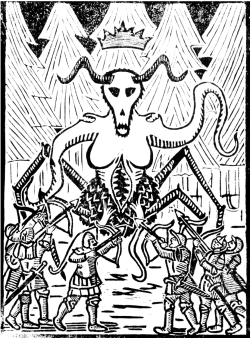Table of Contents
Corruption
Corruption is a score accrued in play, growing from 0 to 18, only the PC doesn't possess the score, the band of Corruptor demons within him does. It has a Corruption bonus, calculated as an ability score bonus is calculated (e.g., a 13 Corruption would yield +1).
The Corruption Score is literally the number of Corruptor demons that have taken up residence in a character's soul. At the GM's discretion, these demons may make a Corruption check against you any time you are offered significant temptation to steal, murder or commit blasphemy (including casting any Atlantean Blasphemy Spells.) This check is modified by the Corruption bonus.
If the demons win the corruption check then you commit the foul deed. They may make a Corruption check each time you try to remedy the corruption. For example, talking to a clergyman or entering a church would warrant a Corruption check. If the prospect of Cast Out Devils or Holy Exorcism is imminent, the demons make the Corruption check with advantage. If the demons win the Corruption check, you will not make the attempt at redemption.
Gaining Corruption
When the demons pass a corruption check, this draws the attention of another corruptor demon, who will try to join the infestation, if its attack is successful, add 1 to your Corruption Score. There are certain acts that automatically lead to an increase in Corruption Score:
- Learning an Atlantean Blasphemy Spell
- Taking part in a human sacrifice
- Using certain evil artifacts
- Desecrating a church
Negative Effects of Corruption
A character whose Corruption score is 13+ is now considered Evil for game mechanic purposes. A character whose Corruption score reaches 18 is gone over to the forces of chaos and death and becomes an NPC.
Removing Corruption
One point of Corruption can be removed by the Cast Out Devils divine spell or Banishment arcane spell. All Corruption can be removed by the Holy Exorcism ritual divine spell. However, the corruptors will resist mightily attempts by the Corrupted person to achieve this end. Any Corruption check made to avoid the removal will be made at Advantage. When cleared of Corruption by a priest or zealot, it is required that you then confess the sins you committed and undergo the penance imposed by the confessor, or else further divine spells will not help you until you do.
An Example of the Corruption System
Pedro of Navarre is a traveling scholar, he recovers the Commentaries of Rufus the Mad and discovers the formula for the Atlantean Blasphemy Create Imp. What could be the harm? He learns the spell and now has a Corruption Score of 1 (he is inhabited by 1 Corruptor Demon). He realizes that using the spell might cost him his soul, but the demon eggs him on. The demon rolls a Corruption Check, its Corruption of 1 yields a modifier of -4, it rolls a 17 minus 4 for 13 total, this is higher than the target of 11, so Pedro goes ahead and casts the spell, increasing his Corruption to 2 (2 demons in residence). His friend Father Edward is concerned, and uses Discern Possession to see that Pedro has been corrupted. When Edward begins to take action, the demons must make another Corruption check (still -4), but at advantage because the Corruptors sense goodness in the air. They roll a 12-4=8, and a 17-4=13, and pass the Corruption check, Pedro flees from Edward in a storm of obscenities and gains another point of Corruption.

